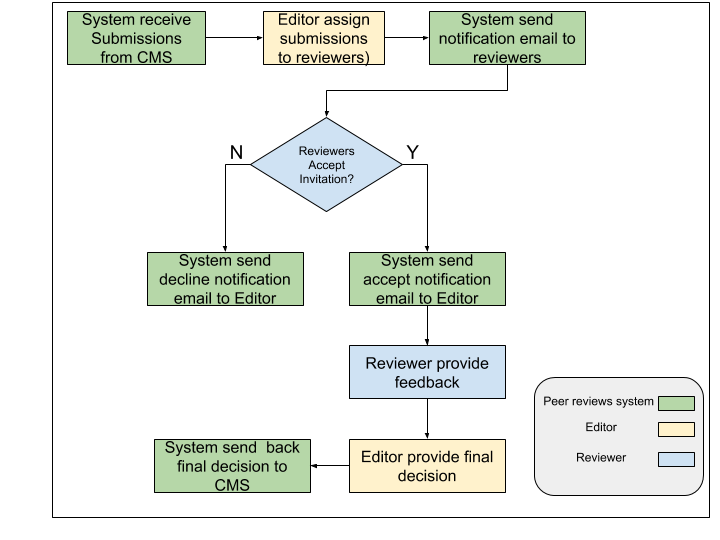Peer review is an evaluation of scientific, academic, or professional work by others working in the same field for a conference or other event. It is an isolated, pluggable peer review service that can interact with a variety of other meetings, conference, and convention services via API calls to provide otherwise missing functionality.
Some stuff here about the basic way that PR works Conferences can be imported. Submissions from those conferences will also be imported (or they can be stored in our backend) Editors can be assigned to those conferences. Editors can assign reviewers to submissions (by creating a blank evaluation) Reviewers fill out the evaluations, and the respective editors are notified Editors make a final decision, with advice from the evaluations, to accept or reject the paper in behalf of the conference.
Install [email protected]
$npm install
$bower install```
Install Python dependencies
```$mkvirtualenv pr
$pip install requirements.txt```
* Ask Cameron, Sherif, or Ryan for a copy of access.txt and where to put it. Peer Reviews will not run without this file.
### User’s Notes
1. A conference is created externally.
2. An admin logs into the peer reviews system (PR hereafter) and specifies the endpoint for that conference. The admin also specifies the endpoint where the submissions to the conference will come from. PR will expect a specific JSON format from the third-party API with the conferences and submissions on it.
3. The admin will specify editors.
4. Editors will have the ability to look through the submissions to the conference and assign them to reviewers. Reviewers will receive an email that they are invited to review a submission. Multiple reviewers can and should be assigned to a single submission, and a reviewer can accept invitations to review multiple submissions at the same time.
5. Reviewers will then grade the submission and upload or input their comments and scoring for the submission, based on the criteria of the conference and/or its editors.
6. Editors will then be notified when all assigned reviewers have either rejected the invitation or accepted and submitted a review, and will then be encouraged to accept or reject the submission on behalf of the conference.
These decisions will be stored in a public endpoint accessible
### Developer's Notes
#### Backend
* API endpoints:
* Actions
* checkLoggedIn
* logoutUser
* getUsername
* getReviewerid
* Models
* Conferences (currently not implemented)
* Submissions
* Reviewers
* Evaluations
* Users
* Emails (_hardly_ implemented)
#### Frontend
Routes
Screens
User Login:
OSF User Authentication:
Peer Review Profile:
My Editing (submission content):
My Editing (Assign reviewers to submission)
My Editing (Editor final decision)
My Reviews
Submission Evaluation (Content)
Submission Evaluation (Feedback)
-----------
### Still Broken
* Emails (commented out)
* To re-enable emails, uncomment the bottom section of settings.py
* This will require the accounts.txt file next to your settings.py file, which means that your travisCI builds will fail since accounts.txt isn't part of the github repo.
-----------
### Future Ideas
* Customizable endpoint that admin adjusts
* On evaluation page, move scoring/feedback to the side, so you can see it at the same time as the paper that you’re evaluating
* Handle upload of files
-----------
### Notes for whoever takes on this project
* __Please don't use controllers whenever remotely possible.__ If you find yourself using a controller, google your situation first to make sure it can't be done with routes or models. Remember that validation can be handled in models, and actions can be stored in routes for almost every situation. This will help build the excitement for Routable Controllers too, which will make this advice obsolete and obvious.
* Only have more than one endpoint on the API for something if it's __absolutely necessary__.
